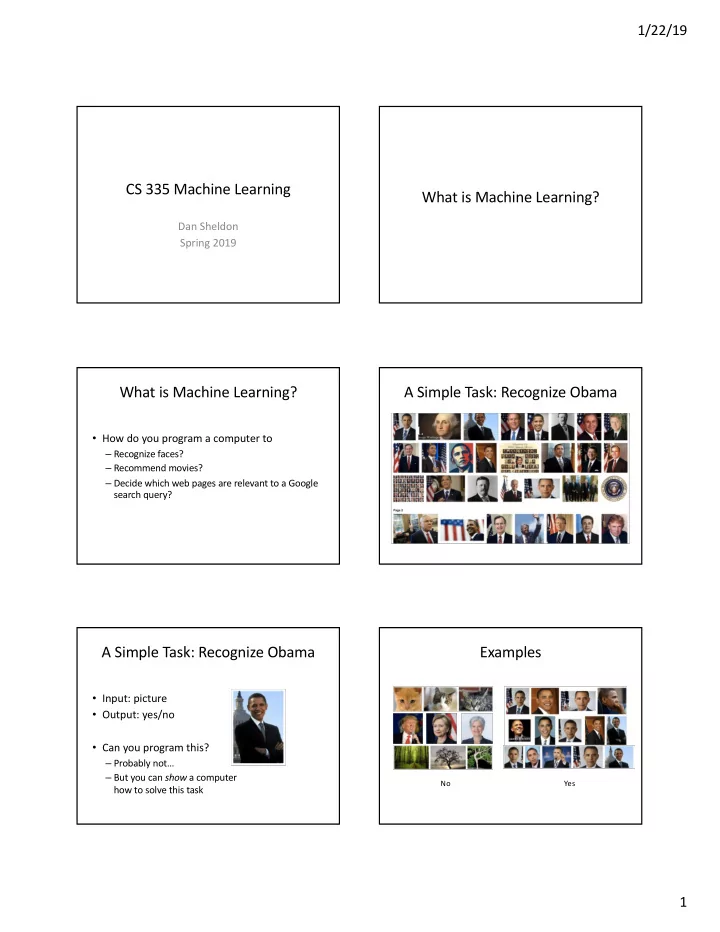

1/22/19 CS 335 Machine Learning What is Machine Learning? Dan Sheldon Spring 2019 What is Machine Learning? A Simple Task: Recognize Obama • How do you program a computer to – Recognize faces? – Recommend movies? – Decide which web pages are relevant to a Google search query? A Simple Task: Recognize Obama Examples • Input: picture • Output: yes/no • Can you program this? – Probably not… – But you can show a computer No Yes how to solve this task 1
1/22/19 Learning from Examples Discussion yes ? • Is it easier to design a learning algorithm or an no Obama recognizer? yes Learning Classifier • Is it more useful to have a learning algorithm or Algorithm no an Obama recognizer? yes • What problems like this would you like to solve? yes no Labeled Examples What is Machine Learning? Why is ML Important? • Machine learning is the practice of programming a computer to learn to solve a • What are some examples of ML in your day- task through experience, rather than directly to-day life? programming it to solve the task. ML makes the world go round. ML Achievements ML wins Jeopardy! 2
1/22/19 ML Achievements ML in Science • Bioinformatics – Gene prediction B φ i − 1 φ i φ i +1 ML watches YouTube for three straight days! Computational Identification of Evolutionarily Conserved Exons (and learns to recognize cats) Y i − 1 Y i Y i +1 Adam Siepel David Haussler Center for Biomolecular Science and Engr. Howard Hughes Medical Institute and http://www.npr.org/2012/06/26/155792609/a-massive-google-network-learns-to-identify University of California Center for Biomolecular Science and Engr. Building High-level Features Using Large Scale Unsupervised Learning Santa Cruz, CA 95064, USA University of California Santa Cruz, CA 95064, USA acs@soe.ucsc.edu haussler@soe.ucsc.edu Quoc V. Le, Marc’Aurelio Ranzato, Rajat Monga, Matthieu Devin, Kai Chen, Greg S. Corrado, X i − 1 X i X i +1 Jeffrey Dean, and Andrew Y. Ng Hidden Markov model ML in Data Science Data Science http://drewconway.com Extracting insight and knowledge from data By Hilary Mason, bitly From forbes.com Course Goals • Learn how to design basic ML algorithms OK, but what are we actually • Learn about specific, widely used ML going to do in this class? algorithms • Learn tools to apply ML algorithms to real data and evaluate their performance 3
1/22/19 Course Structure Course Structure • There are many dimensions of ML methodology: • Supervised learning – Supervised vs. unsupervised – Learn from examples – Linear vs. nonlinear • Unsupervised learning – Univariate vs. multivariate – Regression vs. classification – Find patterns in data – Binary vs. multiclass – Probabilistic or not • Probabilistic learning “20% chance of rain” – Quantify uncertainty “80% chance of survival” “90% sure it is President Obama” • We will touch on most of these Course Webpage http://people.cs.umass.edu/~sheldon/teaching/cs335/index.html • Entry point for all course information – Course policies (review) Logistics – Schedule – Slides – Homework • Office hours: – Tue 4-5pm 3:30-4:30pm, Clapp 200 – Thu 1-2pm, Clapp 200 Math Python • Warning: there is math in this course • All programming in this course done in Python – Calculus • Derivatives – Required environment: • (Partial derivatives) Anaconda 2018.12 for Python 3.7 – Probability – Installed on CS lab computers • Sample space, events, conditional probability, discrete random variables, expected value • Review later in semester – Linear algebra • Python session during class in ~1 week • Matrices and vectors • (Vector norm, dot product, transpose, inverse) • (Manipulation of linear algebraic equations) • But you are largely responsible for learning on • Self-assessment in HW0 your own 4
1/22/19 (If time) A First Supervised Learning What’s Next? Model • Homework 0 posted – By next Tuesday • Other slides and board work • Read course policies • Post on Piazza – By next Friday: • Get started with Python exercise • Optional calculus review? – Derivatives / optima – TBD based on interest… 5
Recommend
More recommend